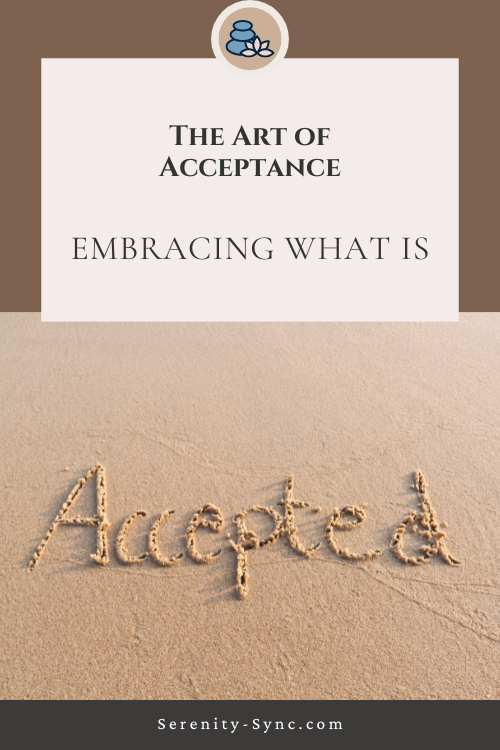In Brief
Acceptance is the process of allowing things to be as they are without trying to change them. It involves letting any experience exist without altering, avoiding, or denying it. Practicing acceptance has been shown to have positive effects on mental health, personal growth, and wellness. It allows people to open themselves to unpleasant feelings or thoughts and move on from issues more quickly. This blog post explores the concept of acceptance, its benefits, and its historical emphasis in religion and spirituality. It also provides practical tips on how to practice acceptance in daily life.

Your Free PDF version of this blog post Awaits – No Strings, Just Click and Enjoy! 🌸🎁
Introduction
In a world that often demands control and change, acceptance is a powerful art that can bring us peace and contentment. It is the act of embracing what is without resistance or judgment. It is about acknowledging and allowing any experience or circumstance to exist without attempting to alter or deny it. This concept has deep roots in spirituality, psychology, and personal growth.
Acceptance plays a crucial role in our mental health and overall well-being. By accepting the present moment and all that it entails, we can cultivate resilience, emotional intelligence, and a greater sense of peace. In this blog post, we will delve into the art of it, exploring its principles, benefits, and practical applications in daily life.
The Process of Acceptance
Understanding the Principles of Acceptance
<p>Acceptance is based on several foundational principles: nonattachment, non-avoidance, nonjudgment, and tolerance. Nonattachment involves letting go of our desire to control or possess things, allowing them to flow freely. Non-avoidance means facing and experiencing all emotions and thoughts without suppressing or avoiding them. Nonjudgment involves refraining from labeling experiences as good or bad, right or wrong. Tolerance is about accepting diversity and the differences in others.
By embracing these principles, we can develop a mindset that is open to whatever life brings, allowing us to navigate challenges with greater ease.
Allowing Unpleasant Feelings and Thoughts
One of the key aspects of acceptance is the willingness to experience and sit with unpleasant feelings and thoughts. Rather than pushing them away or avoiding them, we acknowledge their presence and allow them to be. By doing so, we create space for these emotions and thoughts to naturally pass through us, without getting caught up in a cycle of resistance or rumination.
By accepting our emotions and thoughts without judgment, we can learn to coexist with them and ultimately let them go.
Moving on from Issues and Struggles
Practicing acceptance enables us to move on from issues and struggles more quickly. Instead of getting entangled in negative emotions or dwelling on past events, it allows us to acknowledge what has happened and focus on the present moment. By accepting the reality of a situation, we can redirect our energy towards finding solutions or embracing new opportunities.
Acceptance grants us the freedom to let go of what no longer serves us and move forward with grace and resilience.
The Benefits of Acceptance
The practice of acceptance has numerous benefits for our mental health and overall well-being. Let’s explore some of the positive effects it can have:
Positive Effects on Mental Health
Acceptance has been shown to reduce stress, anxiety, and depression. By accepting our thoughts and emotions without judgment, we can experience a greater sense of peace and contentment. Acceptance allows us to let go of the need for control and perfection, leading to improved self-esteem and a more positive outlook on life.
Furthermore, acceptance promotes mindfulness, which has been proven to enhance mental well-being and reduce psychological distress.
Opening Oneself to New Experiences and Opportunities
When we practice it, we open ourselves up to new experiences and opportunities. By letting go of resistance and judgment, we become more receptive to the present moment and all it has to offer. This mindset allows us to explore different paths and embrace change, leading to personal growth and self-discovery.
Acceptance helps us break free from self-imposed limitations and embrace the full spectrum of life’s possibilities.
Cultivating Resilience and Emotional Intelligence
It is a powerful tool for cultivating resilience and emotional intelligence. By accepting and working through difficult emotions, we develop a greater capacity to bounce back from adversity. Acceptance allows us to acknowledge our emotions without being overwhelmed by them, leading to greater emotional regulation and self-awareness.
Additionally, acceptance helps us develop empathy and understanding towards others, enhancing our interpersonal relationships and overall emotional intelligence.
Practicing Acceptance in Daily Life
Now that we understand the importance and benefits of acceptance, let’s explore some practical tips for incorporating it into our daily lives:
Mindfulness as a Tool for Acceptance
Mindfulness is a powerful practice that can support acceptance. By cultivating present-moment awareness, we can become more attuned to our thoughts, emotions, and bodily sensations. Mindfulness allows us to observe these experiences without judgment, creating space for acceptance to arise naturally.
Engaging in activities such as meditation, deep breathing, or mindful movement can help us develop a greater sense of mindfulness and acceptance in our everyday lives.
Accepting Others as They Are
In addition to accepting ourselves, it is important to extend acceptance to others. Recognize that everyone has their own unique experiences, perspectives, and struggles. Practice empathy and understanding towards others, even when their actions or beliefs differ from your own.
By embracing diversity and accepting others as they are, we can foster stronger connections and create a more compassionate world.
Choosing Not to Judge What Happens to You
Life is filled with ups and downs, and sometimes we may face challenging situations. Rather than immediately labeling these experiences as good or bad, try to suspend judgment and simply observe what is happening. Accept that life is unpredictable and that every experience holds the potential for growth and learning.
By reframing our perspective and choosing not to judge what happens to us, we can approach life with a greater sense of equanimity and peace.
Letting Go of Control and Embracing Imperfection
Acceptance requires letting go of the need for control and embracing imperfection. Understand that not everything in life can be controlled or changed. Instead of striving for perfection, focus on progress and growth. Embrace your flaws and mistakes as opportunities for learning and self-improvement.
By releasing the grip of control and embracing the beauty of imperfection, you can experience a greater sense of freedom and joy.
Finding Gratitude in Difficult Situations
Lastly, practicing acceptance involves finding gratitude even in difficult situations. Shift your focus from what is lacking to what is present. Cultivate a mindset of gratitude by acknowledging the lessons and blessings that arise from challenging experiences.
By finding gratitude, even in the face of adversity, you can foster a sense of contentment and resilience.
Fun Fact
Did you know that the concept of acceptance can be traced back to ancient Eastern philosophies? The teachings of Buddhism and Taoism emphasize the importance of accepting what is and finding peace in the present moment.
Historical Emphasis on Acceptance
Acceptance has long been emphasized in various religious and spiritual traditions as a means of finding peace and contentment. One notable example is the Serenity Prayer, which has become synonymous with acceptance. This prayer, popularized by Alcoholics Anonymous, highlights the importance of accepting the things we cannot change while finding the courage to change the things we can. It serves as a guiding principle for those seeking recovery and personal growth.
Additionally, acceptance is woven into the fabric of many other religious and spiritual practices. For example, Buddhism teaches the concept of non-attachment, which involves accepting and letting go of desires and attachments to find inner peace. Hinduism emphasizes the importance of accepting one’s circumstances and performing duties without attachment to the outcome. These historical examples showcase the universality of acceptance across different faiths and belief systems.
Overcoming Challenges to Acceptance
While acceptance is a powerful concept, it can be challenging to put into practice. Common barriers to it include fear, resistance to change, and the desire for control. Overcoming these challenges requires self-reflection, emotional intelligence, and a willingness to let go of expectations.
One way to address these barriers is by seeking support from friends, family, or professionals. Talking about your struggles and seeking guidance can provide valuable insights and perspectives. Additionally, practicing mindfulness can help cultivate acceptance by allowing you to observe your thoughts and emotions without judgment or attachment.
Remember, acceptance is not about resignation or passivity. It’s about acknowledging reality and finding the strength to work with what you have. By embracing the challenges and uncertainties of life, you can cultivate resilience and open yourself up to new possibilities.
Embracing a Life of Acceptance
Living a life of acceptance means embracing the present moment and finding peace within yourself. It involves letting go of the need for control and embracing the uncertainty that life brings. By practicing acceptance, you can experience a sense of serenity and contentment.
One way to live fearlessly through acceptance is by practicing gratitude. Take time each day to appreciate the small blessings in your life. This cultivates a mindset of abundance and helps shift your focus from what you lack to what you have.
Another essential aspect of it is being fully present in the moment. Often, our minds are consumed by regrets about the past or worries about the future. By grounding yourself in the present, you can let go of unnecessary stress and find clarity and peace.
Ultimately, acceptance is a lifelong journey. It requires patience, self-compassion, and a willingness to let go of what no longer serves you. By embracing it, you can navigate life’s challenges with grace and find true contentment.
Conclusion
Acceptance is not about giving up or being passive; it’s about acknowledging reality and focusing on what you can control. By practicing it, you can experience positive effects on your mental health, personal growth, and overall well-being. Throughout history, it has been emphasized in various religious and spiritual traditions, serving as a guiding principle for finding peace and contentment.
Overcoming challenges to acceptance requires self-reflection, emotional intelligence, and a willingness to let go of expectations. Seeking support from others and practicing mindfulness can also aid in cultivating acceptance. By embracing acceptance, you can live fearlessly, find peace in the present moment, and cultivate resilience.
So, why not start embracing the art of acceptance today? Remember, it is not a one-time event, but a lifelong journey. Embrace the challenges, let go of what no longer serves you, and find true contentment in your life.
Fun Fact
Did you know that acceptance doesn’t mean giving up or being passive? It’s about acknowledging reality and focusing your energy on what you can control. So, next time you find yourself in a challenging situation, remember that acceptance is an act of agency

